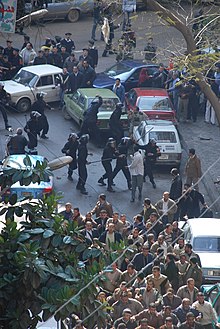
El Mahalla El Kubra – commonly shortened to El Maḥalla – is the largest city of the Gharbia Governorate and in the Nile Delta, with a population of 535,278 as of 2012. It is a large industrial and agricultural city in Egypt, located in the middle of the Nile Delta on the western bank of the Damietta Branch tributary. The city is known for its textile industry, and hosts the Misr Spinning and Weaving Company which employs around 27,000 people.
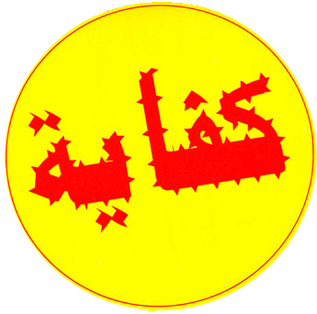
Kefaya is the unofficial moniker of the Egyptian Movement for Change, a grassroots coalition which prior to the 2011 revolution drew its support from across Egypt's political spectrum. It was a platform for protest against Hosni Mubarak's presidency and the possibility he might seek to transfer power directly to his son Gamal; political corruption and stagnation; "the blurring of the lines between power and wealth; and the regime's cruelty, coercion and disregard for human rights."
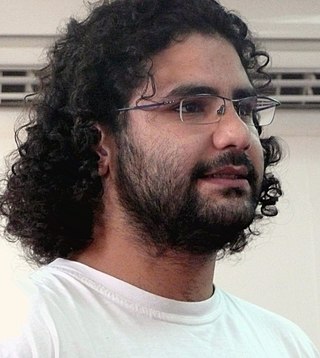
Alaa Ahmed Seif Abd-El Fattah, known professionally as Alaa Abd El-Fattah, is an Egyptian-British blogger, software developer and a political activist. He has been active in developing Arabic-language versions of software and platforms.
The Internet is accessible to the majority of the population in Egypt, whether via smartphones, internet cafes, or home connections. Broadband Internet access via VDSL is widely available.

Wael Abbas Bilal is an internationally renowned Egyptian journalist, blogger, and human rights activist, who blogs at Misr Digital. He reported an incident of mob harassment of women, and broadcast several videos of police brutality. His actions led to the conviction of police for torture, but he has been harassed by the Egyptian government.
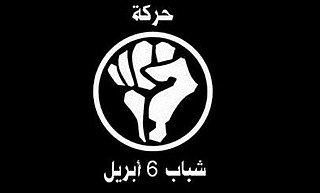
The April 6 Youth Movement is an Egyptian activist group established in Spring 2008 to support the workers in El-Mahalla El-Kubra, an industrial town, who were planning to strike on 6 April.

Khaled Mohamed Saeed was an Egyptian man whose death in police custody in the Sidi Gaber area of Alexandria on 6 June 2010 helped incite the Egyptian Revolution of 2011. Photos of his disfigured corpse spread throughout online communities and incited outrage over the fact that he was beaten to death by Egyptian security forces. A prominent Facebook group, "We are all Khaled Said", moderated by Wael Ghonim, brought attention to his death and contributed to growing discontent in the weeks leading up to the Egyptian Revolution of 2011. In October 2011, two Egyptian police officers were found guilty of manslaughter and sentenced to seven years in prison for beating Saeed to death. They were granted a retrial and sentenced to ten years in prison on 3 March 2014.

The 2011 Egyptian revolution, also known as the 25 January Revolution, began on 25 January 2011 and spread across Egypt. The date was set by various youth groups to coincide with the annual Egyptian "Police holiday" as a statement against increasing police brutality during the last few years of Hosni Mubarak's presidency. It consisted of demonstrations, marches, occupations of plazas, non-violent civil resistance, acts of civil disobedience and strikes. Millions of protesters from a range of socio-economic and religious backgrounds demanded the overthrow of Egyptian President Hosni Mubarak. Violent clashes between security forces and protesters resulted in at least 846 people killed and over 6,000 injured. Protesters retaliated by burning over 90 police stations across the country.
The Hisham Mubarak Law Center is an Egyptian law firm based in Cairo and Aswan which "works in the field of human rights through litigation, campaigns and legal research" and is "perhaps best known for its active support of torture victims and Egyptians subject to arbitrary detention." Founded by Ahmed Seif El-Islam and other human rights defenders in 1999 it has become a major player in Egyptian Human rights advocacy issues.
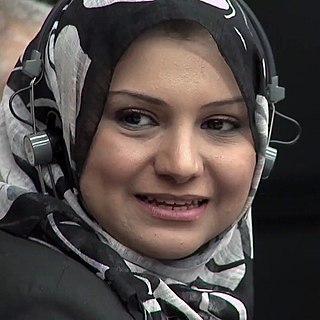
Asmaa Mahfouz is an Egyptian activist and one of the founders of the April 6 Youth Movement. She has been credited by journalist Mona Eltahawy and others with helping to spark a mass uprising through her video blog posted one week before the start of the 2011 Egyptian revolution. She is a prominent member of Egypt's Coalition of the Youth of the Revolution and one of the leaders of the Egyptian revolution.

Wael Ghonim is an Internet activist and computer engineer with an interest in social entrepreneurship.

The following is a chronological summary of the major events that occurred during the Egyptian Revolution of 2011, after Hosni Mubarak's resignation. Protests and riots led to the deaths of hundreds, injuries of thousands and the arrests of tens of thousands. Millions have mobilised the streets since the revolution.
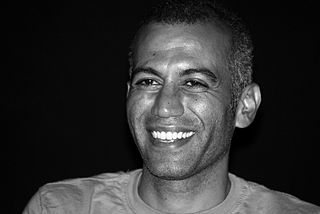
Hossam el-Hamalawy is an Egyptian journalist, blogger, photographer and socialist activist. He is a member of the Revolutionary Socialists and the Center for Socialist Studies.
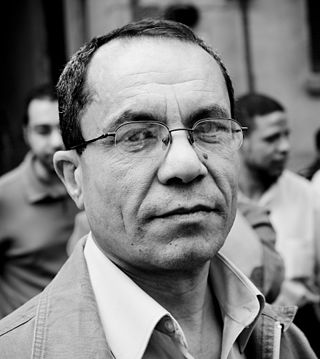
Kamal Abbas is General Coordinator of the Center for Trade Unions and Workers Services (CTUWS), an activist group for independent unions in Egypt. Involved in activism for over 20 years, Abbas has been active in mobilizing worker support during the Egyptian Revolution of 2011 and its aftermath. His approach emphasizes peaceful strikes and rallies accompanied by demands for better wages and working conditions, as well as more regular elections for union officials, and an independent union system.

Wael Khalil is an Egyptian political activist known for his criticism of the Mubarak regime, his activity during the 2011 Egyptian revolution, and his blog WaELK.net which covers government, activism and sports.
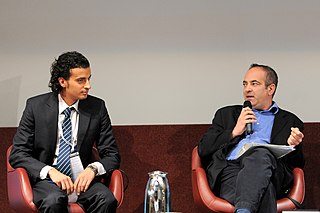
Maikel Nabil Sanad is an Egyptian political activist, blogger, and a former political prisoner. He became famous in 2010 for refusing to serve in the Egyptian army, then in 2011 for his role in the Egyptian revolution.
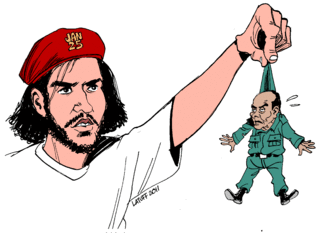
The Wael Mikhael incident occurred on 9 October 2011 when two Egyptian journalists, Wael Mikhael and Mina Daniel, were killed while covering a demonstration that turned into a violent clash between the Egyptian military and Coptic protesters. Mikhael was reporting as a cameraman for the Coptic Orthodox Christian TV station in Cairo and was shot in the head while filming what was supposed to be a peaceful demonstration. Daniel was reporting as a political activist blogger and was shot in the shoulder and leg.

The following chronological summary of major events took place during the 2011 Egyptian revolution right up to Hosni Mubarak's resignation as the fourth President of Egypt on 11 February 2011.
The Misr Spinning and Weaving Company is a large textile company located in El-Mahalla El-Kubra within the Nile Delta of Egypt, approximately 80 kilometers north of Cairo. It is a state-owned enterprise held by the Holding Company for Cotton, Spinning, Weaving and Garments. Egypt's largest industrial facility employs over 25,000 workers, many of whom have played an active role in Egyptian labor struggles. Large protests and strikes at Misr Spinning and Weaving since 2006 contributed to the collapse of the Mubarak government, the 2011 Egyptian revolution, and the Arab Spring more generally.
